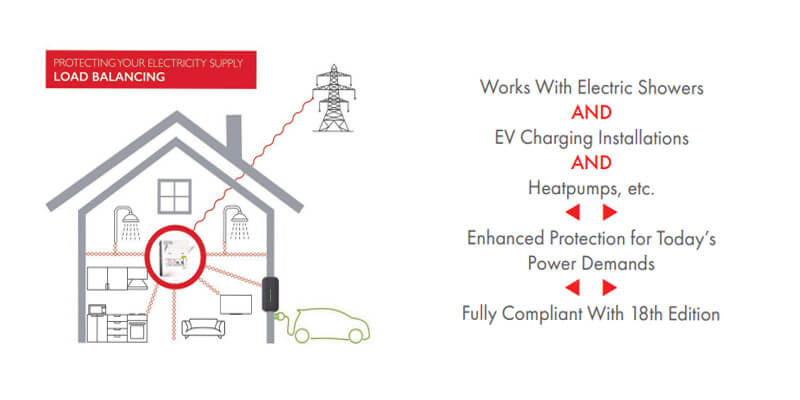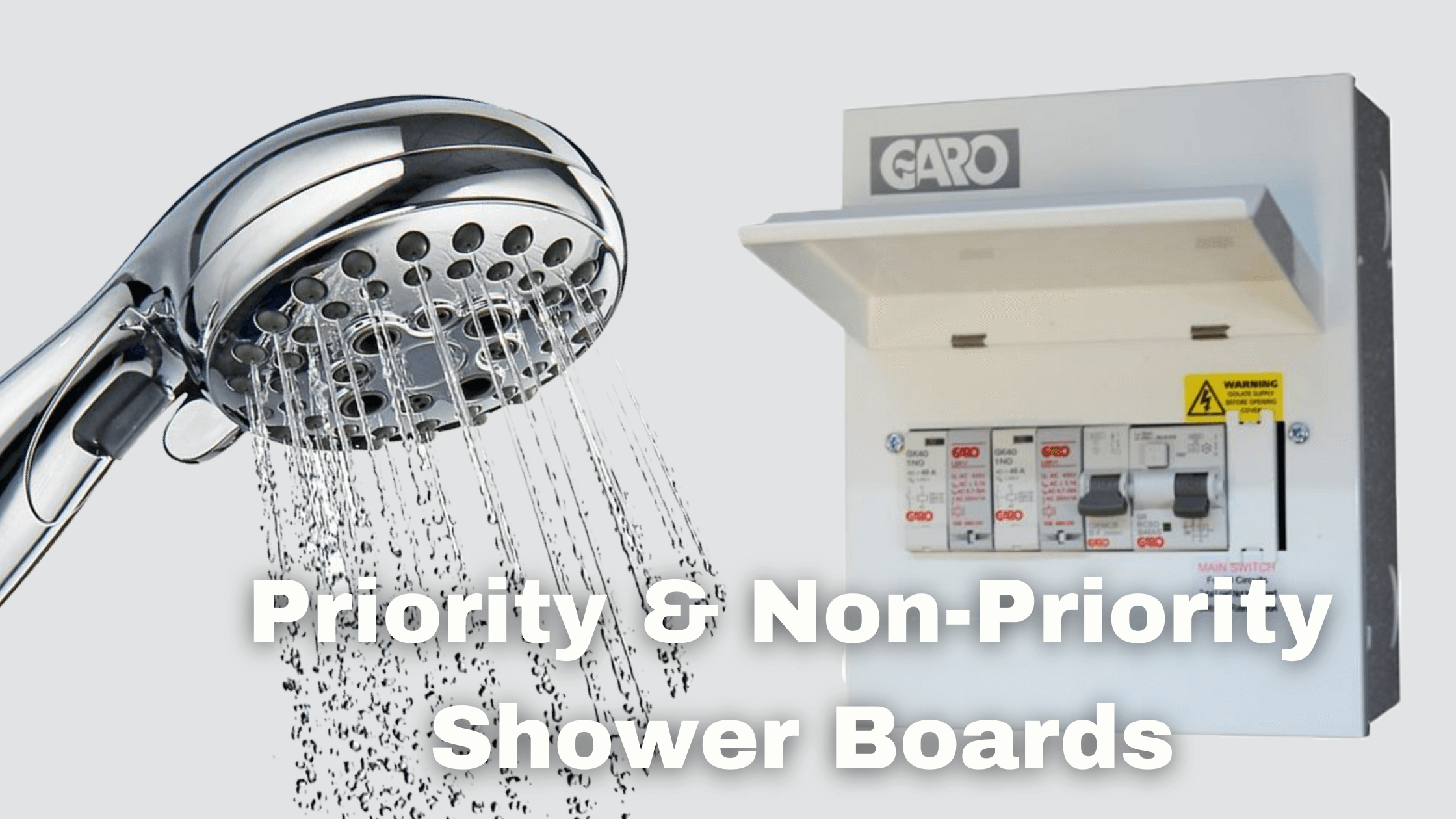Priority & Non-Priority Shower Units
Priority & Non-Priority Shower Units
Electrical showers have become increasingly popular over the years as the key benefit of having a hot water supply on demand which is why they are more common than gas showers. So exactly how does an electric shower work? Unlike, non-electric showers, electric showers take cold water and heat within the device, before dispensing the hot heat through the shower head. However, electric shower power consumption is quite significant. This is why Garo's Conor Charnley, discusses shower priority boards and the importance of having control over loads in the home, particularly with EV chargers coming into play, heavy loads on cookers, etc.
What is the Difference Between a Power Shower and Electric Shower?
Before we answer this, let's first address the queries; what's a power shower? and how do power showers work? A power shower is a type of shower that combines your cold and hot water supplies. It is not unlike a mixer shower, the only difference is that a power shower has a pump for boosting water pressure.
So, what is the different between a power shower and an electric shower? Unlike an electric shower, a power shower doesn't have a built-in heating element. Instead of using the element, a power shower uses hot water from a connecting cylinder. The cylinder could be heated by a boiler while the cold water fomes from your bathroom's regular cold feed.
Do Electric Showers Use a lot of Electricity?
The short answer is yes. The average electric shower power consumption can go up to 1,460 kWh of electricity per year.
Are Electric Showers Safe?
You might be thinking; water and electricity combined don't make for a safe combination. And you're right, in most cases electricity and water should be kept far away from one another. However, if installed correctly, electric showers are perfectly safe!
Importance of Shower Amps and what amp fuses are required:
Many homes today have more than one shower and in many cases, they are electric showers. Electric showers come in different wattages and shower amps. The reason for the varying power ratings on electric showers and shower consumer units are to ensure that the end user receives the desired flow of warm water.
Your electric shower must be wired to a protective device as a safety measure, and the shower amp required will vary depending on the power rating of your system. For example, a 7kW shower unit will need to be 32 Amps. Have a look at the following is list of electric shower ratings, along with their corresponding shower amps:
|
Power Rating |
Shower Amps Required |
|
7kW |
32 Shower Amp |
|
7.5kW |
40 Shower Amp |
|
8kW |
40 Shower Amp |
|
8.5kW |
40 Shower Amp |
|
9kW |
40 Shower Amp |
|
9.5kW |
45 Shower Amp |
|
10.5kW |
50 Shower Amp |
Often electrical showers are rated between 8 & 9KW and take a total of 40 shower amps when they are on. If there are two electric showers on at the same time the total load will be 80 showers amps which exceed the rating of the mains house fuse which could cause it to blow. Therefore, understanding the shower amps is important to protect the main incoming supply.
Many products on the market today combat this problem to ensure that only one can be on at any time. The two main products that allow for this type of control are priority and non-priority units.
Priority Electric Shower Units:
The Priority shower uses a master and slave relationship between the showers. With this controller, the master shower (1) always works when it is switched ON. If the slave shower (2) is operating, and the master shower (1) is turned ON, the slave shower (2) will automatically be switched OFF, even if someone is using it.
Additionally, when an electric vehicle and an electric shower are both installed, this priority electric shower device is particularly successful at controlling the load on the vehicle.
Non-Priority Electric Shower Units:
The purpose of Garo’s non-priority shower boards is to treat all showers equally. No appliances will have priority of use. The non-priority electric shower unit will restrict the power to one appliance at a time. For example, once shower (1) is ON, shower (2) is isolated. Equally, if shower (2) is ON, shower (1) is isolated.
RCD and RCBO for Shower:
An RCD (residual current device) must be installed as, either part of your existing fuse board, or separately, interrupting the circuit to the shower.
A shower RCD unit is easily installed as is simply placed beside your existing fuse board and it also provides a type A RCBO protection so that if a fault does occur the person using the shower will be protected. The supply is connected to the bottom of the RCBO, and the showers are connected as per the wiring instruction. Once this is done by a competent electrician your shower is ready to use without the danger of blowing your main supply.

The Key Features of Garo’s Priority & Non-Priority Shower Boards:
- Simplicity of Usage
- User Guides for Neat Installation
- Enhanced Protection
- Fully Compliant with 18th Edition
- Comprehensive Warranties
At Meteor Electrical there is a range of both priority and non-priority units and boards produced by GARO, a leading manufacturer of industrial electrical components and parts. One of our bestselling GARO products is the Priority Shower Board 6 Amp IP40 1 Row. Shop more shower priority boards from GARO and other popular brands here.
For more information on purchasing one of our priority or non-priority shower boards, RCBOs, MCBS, or accessories send an email at [email protected] or speak to one of our friendly advisors on the live chat.
Does an Electric Shower Heat the Water?
To conclude, "Does an electric shower heat the water?" the answer is a resounding yes. The entire function of an electric shower revolves around its capability to heat the water instantaneously as it flows through the unit. Unlike conventional showers relying on external water heaters, an electric shower has its dedicated internal heating element that gets activated when you turn on the shower. So, to reiterate, "Does an electric shower heat the water?" Absolutely, and it does so efficiently, providing you with on-demand hot water for a comfortable shower experience.

